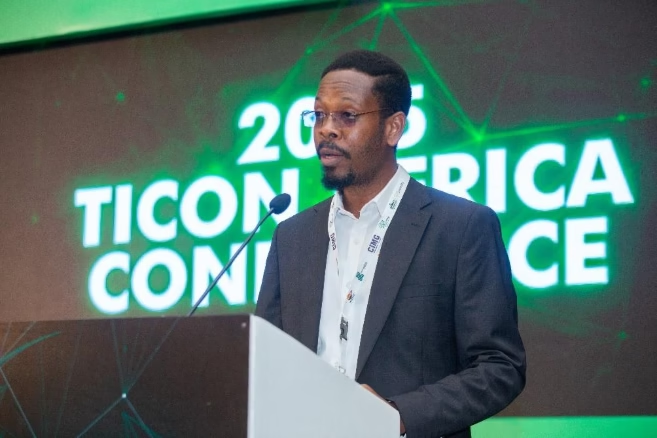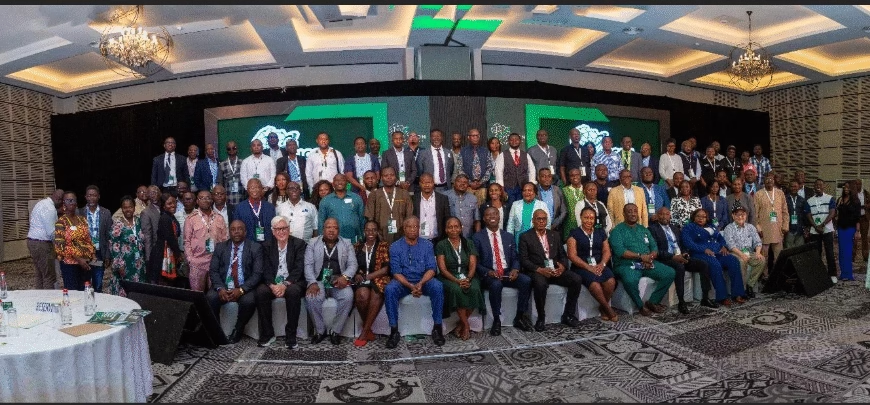The 2025 AMC & TICON Africa Conference brought together over 500 ICT professionals, marketers, policymakers, and industry leaders from 35 African countries, including South Africa, Zambia, Zimbabwe, Malawi, Lesotho, Nigeria, Uganda, Ghana, and many more. Hosted at the Labadi Beach Hotel in Accra, the event marked another milestone in Africa’s digital transformation journey and served as a call to action for collective innovation and cross-border collaboration.
The theme for this year’s conference, “Empowering Africa’s Marketing and ICT Industries: Innovation, Standards, and Global Influence,” highlighted the urgency of aligning Africa’s digital transformation agenda with global best practices while ensuring inclusivity, local ownership, and impact-driven growth.
A Call to Lead Africa’s Digital Future
In his welcome address, Richard Kafui Amanfu, Executive Director of the Institute of ICT Professionals Ghana (IIPGH), underscored the importance of necessity-driven innovation:
“We must innovate, not for novelty, but for impact: not for headlines, but for livelihoods. Whether it is about equipping underserved communities with digital skills, building secure infrastructure, or shaping policies that empower, our mission is clear: technology must serve people, and not the other way around.”

He emphasized Ghana’s strategic role as a hub for innovation and digital transformation on the continent, citing the country’s thriving fintech ecosystem and its ambitious national digitalization agenda.
Mr. Amanfu also challenged stakeholders to invest in digital skills development across urban and rural areas, build agile policy frameworks, and make inclusion not a checkbox but a cornerstone of Africa’s digital future.
Africa’s Growing Pan-African ICT Movement
David Gowu, President of TICON Africa, also delivered the Opening Plenary, reflecting on the organization’s journey from its founding in Victoria Falls, Zimbabwe, in 2022, to its current growth as a Pan-African body. From five national associations, TICON Africa has now expanded to include members from over 15 African countries, with Nigeria, Togo, Tanzania, and Cape Verde joining the movement this year.
Mr. Gowu announced two landmark initiatives:
- The Pan-African Certification Framework – a groundbreaking credentialing system designed to ensure that ICT professionals across the continent have qualifications recognized beyond national borders, aligned with global standards.
- Africa’s Tech Pulse Magazine – a platform to amplify African innovation stories, foster knowledge exchange, and celebrate the trailblazers redefining Africa’s digital space.

He also celebrated Ghana’s digital leadership, particularly the One Million Coders Programme and the forthcoming Ghana-UAE Tech and Innovation Hub. This $1 billion investment is expected to attract more than 11,000 global companies, including Google, Microsoft, Oracle, Meta, and IBM.
“Africa is ready. Ready to lead, ready to innovate, and ready to influence the global digital landscape,” he declared.
Regulatory Sandboxes: A Catalyst for AfCFTA-Driven Growth
One of the strongest outcomes of the conference was a unified call to action urging African governments to prioritize regulatory sandboxes.
Regulatory sandboxes provide controlled environments where innovators can safely test new digital solutions under regulatory oversight. This framework is essential for scaling fintech and cross-border digital services, particularly under the African Continental Free Trade Area (AfCFTA).
Delegates stressed that regulatory sandboxes will:
- Accelerate fintech growth and digital innovation across Africa
- Safeguard consumer interests while allowing responsible experimentation
- Enhance cross-border collaboration under AfCFTA
- Attract investment and stimulate inclusive economic growth
By prioritizing this, African leaders can unlock unprecedented opportunities to integrate technology into trade, finance, and communication, cementing Africa’s role as a driver of global innovation.
Both keynote speakers highlighted that Africa’s digital transformation is ultimately about people. Mr. Amanfu reminded delegates that “digital transformation is not just about technology. It is about trust. It is about values.”
The conference stressed the importance of youth and women’s empowerment as central pillars of Africa’s digital economy. By championing inclusion and democratizing access to opportunities, Africa can nurture a new generation of innovators who will redefine the continent’s future.
The Road Ahead
The AMC & TICON Africa 2025 Conference was not only centered on discussions, but it was also about commitment. Attendees left Accra with renewed determination to translate conversations into action, creating measurable programs and partnerships that will outlast the event.
The presence of delegates from 35 countries underscored the growing consensus that Africa’s ICT and marketing industries must unite under shared standards, innovation ecosystems, and policies that drive continental growth.
As the world looks toward Africa, AMC & TICON Africa has positioned itself as the voice of ICT professionals and marketers and a driver of continental collaboration. With its bold initiatives, regulatory foresight, and focus on people-centered transformation, Africa is no longer waiting for the future; it is shaping it.
AMC & TICON Africa 2025 has made one thing clear: Africa’s digital future is not a distant dream. It is a present responsibility, and it belongs to us all.
Author: Dorothy Klutse, Digital Skills Training Supervisor | Member, IIPGH
For comments, contact: dorothyklutse1@gmail.com or 0548730372





